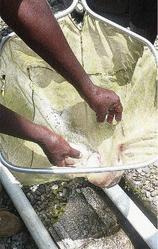
A nearly fully grown tilapia is snagged for viewing during the tour. The waste water from the fish will fertilise plants and the water recycled into the fish tanks.
There's something fishy going on on the Green Produce Farm.
But unlike the usual meaning that comes to mind with that statement, this is actually good stuff. The 'stuff' is called aquaponics. It involves raising tilapia in tanks. Nothing new there, right? But how about using the waste water from the fish tank (which becomes poisonous for them after a while anyway) and using it as fertiliser for plants?
New methods
That's what aquaponics is all about and Patricia Isaacs-Green is in the final stages of preparation to start practising it. She learned about this type of agri-business in the US Virgin Island of St Croix. One of the methods she is planning to implement is to place seedlings in cups floating on the water, so they are germinated right there. The plants take up the nutrients through their roots, reducing or eliminating the water's toxic levels for the aquatic animals. The water from the plants is passed back to the tanks/ponds through pipes and so the water is recycled. This ties in well with the alternative energy farm she is trying to operate.
Profitable business
The production of tilapia is itself a potentially profitable business. While explaining how aquaponics works, she showed us a male that was close to five pounds. "When you hold them and they feel nice and slimy, then they're ready," she said. The aquaponics aspect would be one of the major attractions on the tour which she also plans to offer to visitors, whether tourists or schoolchildren.
Other benefits of aquaponics include saving money on filtering the waste water (because the plants do it naturally), the absence of a need for using pesticides and it can grow various crops including tomatoes and peppers.
daviot.kelly@gleanerjm.com

